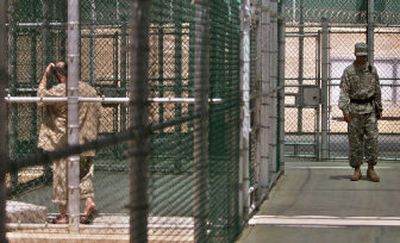Guantanamo food making detainees fat

SAN JUAN, Puerto Rico – A high-calorie diet combined with life in the cell block – almost around the clock in some cases – is making detainees at Guantanamo Bay fat.
Meals totaling a whopping 4,200 calories per day are brought to their cells, well above the 2,000 to 3,000 calories recommended for weight maintenance by U.S. government dietary guidelines. And some inmates are eating everything on the menu.
One detainee has almost doubled in weight, to 410 pounds, said Navy Cmdr. Robert Durand, spokesman for the detention facilities at Guantanamo, a U.S. Navy station in southeast Cuba.
Human rights groups attribute the weight gain to lack of exercise. They cite accounts of released detainees who complained they were allowed to exercise fewer than three times a week outside their small cells.
But Durand said detainees are simply served a wide variety of food and are expected to choose what appeals to them.
“The detainees are advised that they are offered more food than necessary, to provide choice and variety, and that consuming all the food they are offered will result in weight gain,” he said.
Most of the prisoners at Guantanamo picked up in Afghanistan and other conflict zones were slightly underweight when they arrived. Since then, they’ve gained an average of 20 pounds, and most are now “normal to mildly overweight or mildly obese,” according to the most recent measurements, he said.
The meals include meats prepared according to Islamic guidelines, along with fresh bread, vegetables and yogurt. With nearly all detainees fasting in the daytime during the Muslim holy month of Ramadan, authorities have arranged for a post-sunset meal and a midnight meal. Traditional desserts and honey also are served during the Ramadan observances.
Even two detainees who have been on a hunger strike for more than a year are at “100 percent ideal body weight,” from nutrients fed through tubes inserted in their noses, Durand said.
The calorie intake at Guantanamo is well above the norm for federal inmates in the United States, who receive about 2,900 calories a day, said U.S. Bureau of Prisons spokesman Michael Truman. He said weight gain in the civilian system is not widespread and that most inmates “keep themselves in pretty good shape.”
Prisoners at Guantanamo who behave well get more exercise time. The most compliant get up to 12 hours a week, including access to treadmills, stationary bikes and other fitness equipment, Durand said. Guantanamo officials say compliance is gauged solely by whether a detainee follows detention center rules and avoids causing disturbances, and has nothing to do with whether he is providing information to interrogators.
Detainees clashed with guards in May, using fan blades and broken light fixtures as makeshift weapons. Other inmates were recently discovered to be removing springs from sink faucets to use as stabbing weapons, the military says.
The facility now holds about 460 detainees, some of them kept for more than four years on suspicion of links to al-Qaida and the Taliban. President Bush recently transferred 14 terrorism suspects, previously held at CIA secret prisons, to Guantanamo.